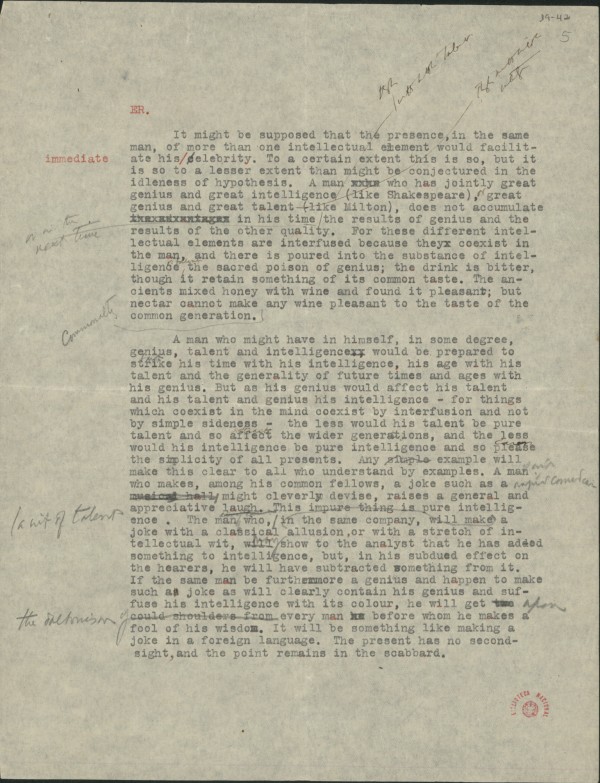Identificação
[19 – 42]
Erostratus.
It might be supposed that the presence, in the same man, of more than one intellectual element would facilitate his immediate celebrity. To a certain extent this is so, but it is so to a lesser extent than might be conjectured in the idleness of hypothesis. A man who has jointly great genius and great intelligence though with little talent (like Shakespeare), or great genius and great talent though with little intelligence (like Milton), does not accumulate in his time or in the next time the results of genius and the results of the other quality. For these different intellectual elements are interfused because they coexist in the man, and there is poured into the substance of intelligence or talent the sacred poison of genius; the drink is bitter, though it retain something of its common taste. The ancients mixed honey with wine and found it pleasant; but nectar cannot make any wine pleasant to the taste of the common generation[1].
A man who might have in himself, in some degree, genius, talent and intelligence would be prepared to strike[2] his time with his intelligence, his age with his talent and the generality of future times and ages with his genius. But as his genius would affect his talent and his talent and genius his intelligence – for things which coexist in the mind coexist by interfusion and not by simple sideness – the less would his talent be pure talent and so affect[3] the wider generations, and the less would his intelligence be pure intelligence and so please[4] the simplicity of all presents. Any example will make this clear to all who understand by examples. A man of wit who makes, among his common fellows, a joke such as rapid comedian[5] might cleverly devise, raises a general and appreciative laugh. This impure thing is pure intelligence. The man who will make, in the same company, a joke with a classical allusion, or with a stretch of intellectual wit, may show to the analyst that he has added something to intelligence, but, in his subdued effect on the hearers, he will have subtracted something from it. If the same man be furthermore a genius and happen to make such a joke as will clearly contain his genius and suffuse his intelligence with its colour, he will get upon the daltonism of every man before whom he makes a fool of his wisdom. It will be something like making a joke in a foreign language. The present has no second-sight, and the point remains in the scabbard.
[19 – 42]
Heróstrato.
Pode supor-se que a presença, num mesmo homem de mais do que um elemento intelectual facilitaria a sua celebridade. Atá certo ponto isto é assim, mas é assim em menor extensão do que poderia ser conjecturado na indolência da hipótese. Um homem que que possui conjuntamente grande génio e grande inteligência, embora com pouco talento (como Shakespeare), ou grande génio e grande talento, embora com pouca inteligência (como Milton), não acumula na sua época ou na próxima os resultados do génio nem os resultados da outra qualidade. Pois estes diferentes elementos intelectuais encontram-se fundidos, porque coexistem no homem, e derrama-se na substância da inteligência ou talento o sagrado veneno do génio; a bebida é amarga, ainda que retanha algo do seu sabor comum. Os antigos misturavam mel com vinho na consideravam-no agradável; mas o néctar não pode tornar nenhum vinho agradável ao paladar de geração comum.
Um homem que pudesse ter em si, num certo grau, génio, talento e inteligência estaria preparado para atingir o seu tempo com a sua inteligência, a sua época com o seu talento e a generalidade dos tempos e épocas futuros com o seu génio. Mas como o seu génio afectaria o seu talento e o seu talento e génio a sua inteligência – pois as coisas que coexistem na mente coexistem pela interpenetração e não por estarem simplesmente umas ao lado das outras – menos o seu talento seria puro talento e, desse modo, afectaria mais gerações e menos a sua inteligência seria pura inteligência e agradaria, desse modo, à simplicidade de todos os presentes. Qualquer exemplo tornará isto claro para todos que compreendam através de exemplos. Um homem de sagacidade que faça entre os seus companheiros uma piada, tal como um rápido comediante poderá habilmente inventar, provoca uma gargalhada geral e apreciativa. Esta coisa impura é pura inteligência. Um homem que faça, igualmente acompanhado, uma piada com uma alusão clássica ou com uma tirada de sagacidade intelectual, pode mostrar ao que o analisa que ele adicionou algo de inteligência, mas, no seu efeito moderado sobre os ouvintes, terá subtraído algo dela. Se esse mesmo homem for, além disso, um génio e fizer essa piada de forma a conter claramente o seu génio e ofusque a sua inteligência com a sua cor, ele confrontar-se-á com o daltonismo de todos, diante dos quais a sua sabedoria parecerá ridícula. Será algo como fazer uma piada numa língua estrangeira. O presente não tem segundos sentidos e o ponto essencial passará despercebido.
[1] common generation /commonalty\
[2] strike /beat\
[3] affect /attract\
[4] please /caress\
[5] rapid comedian /a wit of talent\


